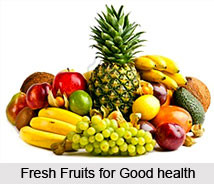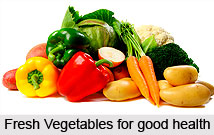 Diet therapy provides certain guidelines, which a person should adopt for a leading a healthy life.
Diet therapy provides certain guidelines, which a person should adopt for a leading a healthy life.
Firstly, foods should be cooked properly. Uncooked or raw food can cause problem in digestion. Secondly, only salad vegetables and fruits are healthy if it is eaten raw. Thirdly, fruits which are overripe or under ripe must be avoided. Fourthly, foods must be a combination of the four basic nutrients- carbohydrates, proteins, fats and water. Fifthly, food should be neither too hot nor too cold when eaten. Sixthly, if curd is taken after a heavy meal it helps in digestion and therefore curd can be taken.
Diet therapy provides certain guidelines, regarding the manner of eating. The therapy suggests that first the wastes should be eliminated and after that a new meal should be consumed. One should not eat or drink anything if the bowel movements have not been proper. Foods should be chewed properly before swallowing. The saliva in the mouth aids in digestion of carbohydrates.There should be a minimum gap of three hours before the next meal whether it is breakfast, lunch or dinner.
 Diet therapy recommends that for a healthy living a person should take a heavy lunch and a light dinner. In this way the food will be digested in the daytime and during night the body will not have to overwork for digesting the food. It is not good to sit down to work immediately after a heavy meal because the body needs enough time for digesting the food. One should never eat to the full capacity. The ideal limit is nearly two-thirds of the capacity of the stomach, as this will prevent digestive ailments.
Diet therapy recommends that for a healthy living a person should take a heavy lunch and a light dinner. In this way the food will be digested in the daytime and during night the body will not have to overwork for digesting the food. It is not good to sit down to work immediately after a heavy meal because the body needs enough time for digesting the food. One should never eat to the full capacity. The ideal limit is nearly two-thirds of the capacity of the stomach, as this will prevent digestive ailments.
Diet therapy recommends certain combination of food as incompatible foods, which should be avoided. The two sets of food are incompatible and hence can be a problem for the digestive system. Diet therapy provides a list of such foods, which should not be, consumed together, fruits and starchy foods such as potatoes, melons and grains, milk and meat, milk and melons, fish and sugar, raw meats and wine, sour and astringent foods, sweet and astringent foods, bitter and astringent foods, oily foods and water, bananas and curds, bananas and milk, bananas and dates, bananas and black gram soup, sweet and salty foods and sweet and bitter foods.




